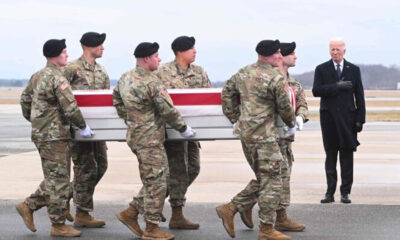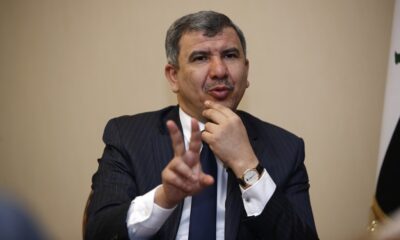International
US drone strike in Baghdad kills Iraq-based militia leaders
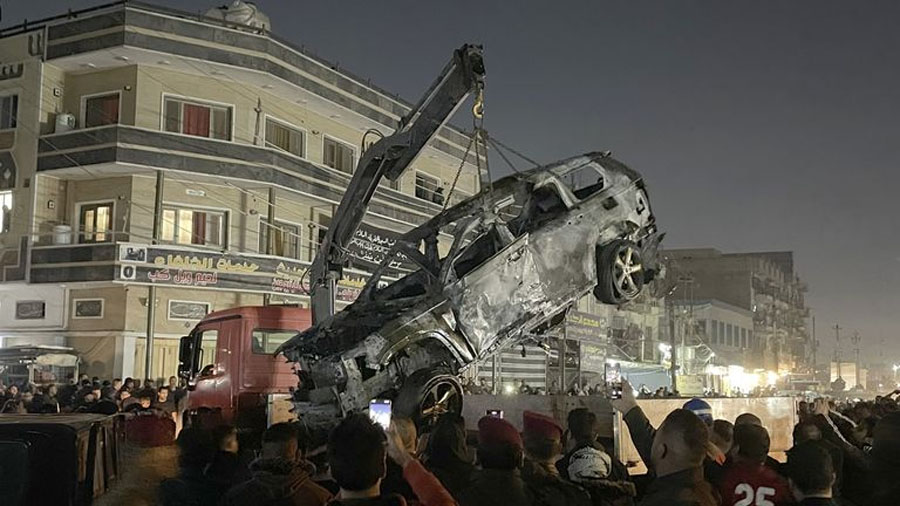
US drone strike in Baghdad kills Iraq-based militia leaders
On Wednesday evening, the United States launched a drone hit in Iraq’s capital, killing three Kataib Hezbollah militia members, including a top commander.
Washington’s Central Command (CENTCOM) has claimed credit for the attack.
This comes after the US government admitted that it failed to alert officials in Baghdad about airstrikes on Iraqi soil last Friday, despite initially saying they had been notified in advance. A top US spokesperson said there was no “intent to deceive,” attributing the mishap to a simple misunderstanding.
A car in which the trio was travelling was struck in the Mashtal neighborhood of Baghdad, at around 9:30 pm local time. Local outlet Sabereen News described the attack as “American aggression.”
Photos circulating on social media showed the remnants of what seems to have been a Hellfire missile, commonly used by US attack drones.
Two of the dead have since been identified as Haj Arkhan Al-Alawi and Wissam Mohammed ‘Abu Bakr’ al-Saadi, who was in charge of Kataib Hezbollah’s operations in Syria, RT reports.
In a statement posted on X, (formerly Twitter), CENTCOM said it had carried out “a unilateral strike in Iraq in response to the attacks on US service members, killing a Kataib Hezbollah commander responsible for directly planning and participating in attacks on US forces in the region.”
READ ALSO:
- Naira falls to N1,500/$ on parallel market
- Terrorists murder Kogi traditional ruler on his farm
- Gaza ceasefire: Israel’s PM Benjamin Netanyahu rejects Hamas’s proposed terms
The US has blamed Kataib Hezbollah for last month’s attack that killed three US soldiers at a base on the Syria-Jordan-Iraq border. Following a series of retaliatory US airstrikes, the group announced it would “suspend” attacks.
Local media in Baghdad have reported that crowds of protesters gathered at the strike site chanting slogans branding the US “Greater Satan.”
Al-Saadi is the most senior Kataib Hezbollah member to have been killed in Iraq since the January 2020 drone strike that killed Abu Mahdi al-Muhandis and Iranian General Qassem Soleimani. Tehran had responded to that assassination by bombarding US bases with ballistic missiles.
Shia militias have attacked US bases in the region with rockets and drones at least 150 times since last October, following Israel’s declaration of war on Hamas in the aftermath of the militant group’s deadly raids from Gaza.
The White House has blamed Tehran for the attacks but has stopped short of attacking Iran as some members of Congress have demanded. The US has continued to station troops in Iraq even after the government in Baghdad explicitly requested them to leave. The Pentagon’s presence in Syria is illegal under international law.
Speaking to reporters on Tuesday, White House National Security Council spokesman John Kirby corrected a prior statement about the “pre-notification to Iraqi officials” before last week’s air raid, which targeted more than 85 sites across both Iraq and neighbouring Syria.
“I deeply apologise for the error, and I regret any confusion that it caused. It was based on information we had or that was provided to me in those early hours after the strikes. Turns out that information was incorrect,” Kirby said, adding, “I hope that you’ll understand there was no ill-intent behind it, no deliberate intent to deceive or to be wrong.”
US drone strike in Baghdad kills Iraq-based militia leaders
International
Russia urges Israel to comply with international humanitarian law in Rafah

Russia urges Israel to comply with international humanitarian law in Rafah
Russia has urged Israel to comply with international humanitarian law as its military operation in the Gazan city of Rafah has become an additional destabilising factor in the situation in the Middle East.
Russian Foreign Ministry spokeswoman Maria Zakharova disclosed this on Wednesday while answering reporters’ questions.
On Monday, Israel started a military operation in the eastern parts of Rafah and took control of the Gaza side of the Rafah crossing with Egypt.
READ ALSO:
- Suspect narrates why he killed sugar mummy in Delta
- We may shut down Nigeria’s economy over cybersecurity levy – TUC
- Just in: EFCC arraigns ex-court registrar over N3.8m fraud
Hamas said it had agreed to the provisions of the ceasefire deal proposed by Egypt and Qatar mediators, but Israeli Prime Minister Benjamin Netanyahu called the truce deal unacceptable.
Over a million people are believed to be sheltering in the city.
“An additional destabilising factor, including for the entire region, was the start of Israel’s ground military operation in Rafah in southern Gaza. About 1.5 million Palestinian civilians are concentrated there.
“In this regard, we demand strict compliance with the provisions of international humanitarian law,” Mr Zakharova told reporters.
Russia urges Israel to comply with international humanitarian law in Rafah
International
African Union condemns Israeli incursion into Rafah, calls for international intervention
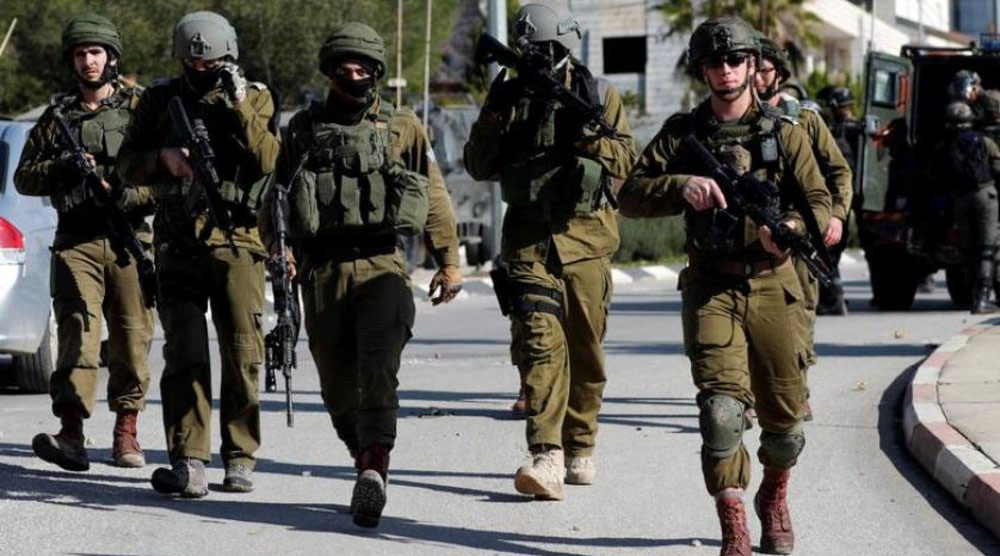
African Union condemns Israeli incursion into Rafah, calls for international intervention
The African Union (AU) has denounced the Israeli military’s recent actions in southern Gaza’s Rafah and urged the international community to intervene to halt the escalation of the conflict.
In a statement, AU Commission chief Moussa Faki Mahamat strongly condemned the extension of the war to the Rafah crossing, a crucial corridor for humanitarian aid into the besieged Palestinian territory.
Faki expressed extreme concern about the ongoing conflict in Gaza, emphasizing the significant loss of life and destruction of infrastructure. He called on the entire international community to coordinate efforts to stop the deadly escalation.
READ ALSO:
- Tragedy as generator fumes kills mother, child in Delta
- FG reacts to Binance’s $150 million bribe allegation
- UNICROSS workers jubilate over sack of vice chancellor
The Israeli incursion into Rafah occurred as negotiators and mediators convened in Cairo to seek a ceasefire in the seven-month conflict between Israel and Hamas.
Israel announced the reopening of the Kerem Shalom border crossing for humanitarian aid to Gaza, four days after its closure in response to a rocket attack that killed four soldiers. Additionally, the Erez border crossing between Israel and northern Gaza was opened for aid deliveries for the first time since the conflict began.
Both the United Nations and the United States, Israel’s staunch ally, condemned the closure of the crossings, which are vital for civilians facing severe humanitarian crises, including famine.
African Union condemns Israeli incursion into Rafah, calls for international intervention
International
Israel seizes key Gaza border, launches assault on Rafah
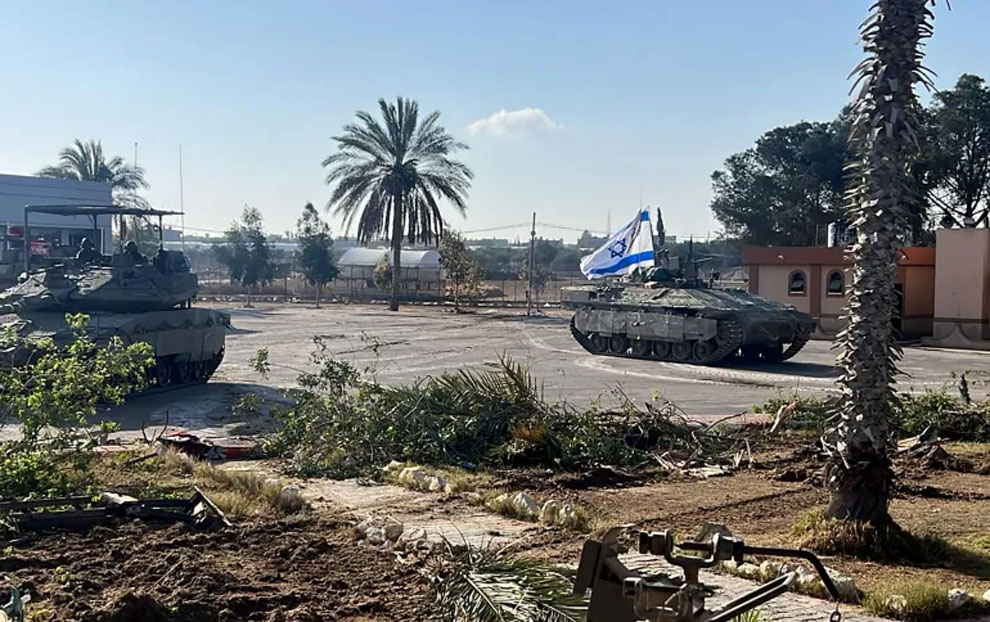
Israel seizes key Gaza border, launches assault on Rafah
Israeli forces have seized control of Gaza’s Rafah border crossing, cutting off a vital route for humanitarian aid and potential sanctuary for civilians from a building offensive.
The Israeli military said on Tuesday that it had seized “operational control” of the Gaza side of the border post, which links the besieged enclave with Egypt. The closure of the crucial passage and positioning of tanks in the centre of Rafah is seen as a demonstration of Israel’s determination to press on with an assault on the southern city despite ongoing truce talks.
The 401st Brigade entered the Rafah crossing early on Tuesday, the Israeli military said, closing a route vital for the aid entering Gaza and any civilians able to flee the fighting to Egypt.
The military claimed that the crossing was “being used for terrorist purposes”, alleging that Hamas’s mortar attack on Sunday on the Karem Abu Salem crossing, known as Kerem Shalom to Israelis, which remains closed, was launched from the vicinity. However, it has not so far provided evidence.
The operation came amid an overnight assault on eastern parts of the city. Warplanes pounded residential homes, killing at least 12 people.
Israel’s military said in a statement it had struck numerous Hamas targets in eastern Rafah, killing about 20 fighters.
A spokesman for the Palestinian Crossings Authority acknowledged to The Associated Press news agency that Israeli forces had seized the crossing and closed it for the time being.
READ ALSO:
- US, UK, most EU nations to boycott Putin inauguration
- Why Atiku is afraid of the coastal highway project success – Presidency
- Depressed Delta lady kills self over hardship
“It’s been a very difficult night,” reported Al Jazeera’s Hani Mahmoud from Rafah. “It’s been very violent, very bloody and full of destruction.”
The assault comes despite Hamas having said on Monday that it had agreed with the terms of a truce deal hammered out by mediators.
However, pressed by hardline nationalist coalition partners who have demanded a full offensive on Rafah, Israeli Prime Minister Benjamin Netanyahu appears set to press on regardless.
Trapped
Tareq Abu Azzoum reported from Rafah that the Israeli military carried out an incursion on the eastern side of Rafah, during which there was a heavy exchange of fire with Hamas fighters amid an intense bombing campaign, with the main objective of seizing control of the crossing.
The Israeli control of the border post “is devastating because … Palestinians will no longer be able to leave the territory”, he said.
Despite urgent warnings from its closest allies that an offensive on the city risks huge numbers of civilian casualties, Israel insists that its plans will allow it to clear Rafah and press on to attack the Hamas command and fighters there.
“The Rafah offensive has started again, in spite of all the requests of the international community, the US, the European Union member states, everybody asking Netanyahu not to attack,” Josep Borrell, the EU’s top diplomat, told journalists on Tuesday. “I am afraid that this is going to cause again a lot of casualties, civilian casualties. Whatever they say,” he said, adding, “there are no safe zones in Gaza.”
READ ALSO:
- CBN directs banks to start deducting cybersecurity levies from customers
- Olise scores twice as Crystal Palace trash Manchester United
- Many injured as Police teargas Delta protesters
Israeli forces whipped up panic on Monday as they ordered 1.4 million or so Palestinians in Rafah – most of whom are displaced following previous instructions from the Israeli military – to evacuate.
The Israeli army reiterated on Tuesday that it has “encouraged” displaced people and international humanitarian organisations operating in eastern Rafah to “temporarily evacuate”.
However, people sheltering in Rafah, amid poor conditions with little shelter, food, or medicine, have few places to go.
The closure of the border crossing only threatens to worsen those shortages and trap more people close to the fighting.
Sources from three humanitarian relief agencies told the Reuters news agency that aid shipments had been halted due to the closure of the crossing.
The latest Israeli operation sees them being pushed towards al-Mawasi on the coast, where the military says it has set up field hospitals, tents, and medical supplies.
“The Israeli military is … strategically cutting off the Gaza Strip and sealing it off from the region,” suggested Al Jazeera’s Mahmoud.
“With the Israeli military presence there right now, we can safely say that we’re looking at a very difficult situation in terms of getting humanitarian aid into Gaza,” he said.
“At the same time, when we look at the location of the Rafah crossing, at almost the centre of the city, that indicates that we’re very close to a full invasion of Rafah.”
Israel seizes key Gaza border, launches assault on Rafah
-
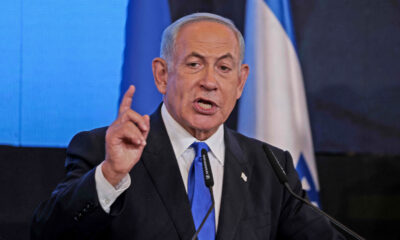
 International2 days ago
International2 days agoNetanyahu rubbishes Hamas ceasefire proposal
-

 Politics2 days ago
Politics2 days agoAbia deputy gov candidate, lawmaker dump PDP
-

 News3 days ago
News3 days agoNigerian varsity VC suspended over alleged gross misconduct
-

 metro1 day ago
metro1 day ago33 states face flooding risk, NEMA warns
-

 metro2 days ago
metro2 days agoThree siblings attack school teacher for flogging brother in Port Harcourt
-

 Business3 days ago
Business3 days agoIkeja Electric cuts tariff for Band A customers
-

 Business1 day ago
Business1 day agoFuel: Independent marketers introduce new pump price
-

 metro1 day ago
metro1 day agoDSS nabs wanted Oyo motorpark boss

